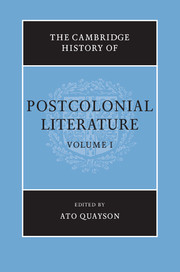Book contents
- Frontmatter
- 1 Introduction: postcolonial literature in a changing historical frame
- 2 Postcolonial fictions of slavery
- 3 Postcolonialism and travel writing
- 4 Missionary writing and postcolonialism
- 5 Postcolonial auto/biography
- 6 Orality and the genres of African postcolonial writing
- 7 Canadian literatures and the postcolonial
- 8 Postcolonialism and Caribbean literature
- 9 Postcolonialism and Arab literature
- 10 Postcolonialism and postcolonial writing in Latin America
- 11 Postcolonial writing in South Africa
- 12 Postcolonial literature in Southeast Asia
- 13 Postcolonial South Asian poetry
- 14 Postcolonial writing in India
- 15 Postcolonial writing in Australia and New Zealand
- 16 Indigenous writing in Canada, Australia and New Zealand
- 17 Postcolonial writing in Ireland
- 18 Postcolonial writing in Britain
- 19 Postcolonial writing in France
- 20 Postcolonial writing in Germany
- References
18 - Postcolonial writing in Britain
Published online by Cambridge University Press: 28 January 2012
- Frontmatter
- 1 Introduction: postcolonial literature in a changing historical frame
- 2 Postcolonial fictions of slavery
- 3 Postcolonialism and travel writing
- 4 Missionary writing and postcolonialism
- 5 Postcolonial auto/biography
- 6 Orality and the genres of African postcolonial writing
- 7 Canadian literatures and the postcolonial
- 8 Postcolonialism and Caribbean literature
- 9 Postcolonialism and Arab literature
- 10 Postcolonialism and postcolonial writing in Latin America
- 11 Postcolonial writing in South Africa
- 12 Postcolonial literature in Southeast Asia
- 13 Postcolonial South Asian poetry
- 14 Postcolonial writing in India
- 15 Postcolonial writing in Australia and New Zealand
- 16 Indigenous writing in Canada, Australia and New Zealand
- 17 Postcolonial writing in Ireland
- 18 Postcolonial writing in Britain
- 19 Postcolonial writing in France
- 20 Postcolonial writing in Germany
- References
Summary
In March 1956, the popular writer Colin MacInnes published an essay in the journal Twentieth Century titled ‘A short guide for Jumbles’. The essay was in the form of an imaginary dialogue between a white British citizen – the ‘Jumble’ of the title, a corruption of ‘John Bull’ – and MacInnes, who proceeded to explain and advocate for the presence of postwar Britain’s new African, Caribbean and South Asian populations. In answering questions such as ‘why do they come here?’ and ‘is there a colour bar in England?’ MacInnes involves himself in two tasks simultaneously: providing the Jumble with an impression of how Britain’s latest migrants see host peoples, and offering a sympathetic if combative account of the fortunes of the migrants that is ultimately intended to challenge racist and prejudicial views. Standing between native and newcomer, acting as a way of opening an enlightening envisioning of one to the other, MacInnes occupies an unsteady but illuminating vantage point. Born in London in 1914, he was raised in Australia and only returned to the county of his birth in 1931, settling in London after World War II. Neither native Londoner nor New Commonwealth migrant, MacInnes considered himself ‘partly a foreigner’ when he returned to London as a young man and described himself as a perpetual ‘inside-outsider’ due to his Australian upbringing. Thus, he was both within but to one side of the Britain about which he wrote in his journalism and fiction, and in contrast to those who felt that the nation was threatened by immigration (both at the time and since) he prized keenly Britain’s new migratory multicultural admixture.
- Type
- Chapter
- Information
- The Cambridge History of Postcolonial Literature , pp. 571 - 603Publisher: Cambridge University PressPrint publication year: 2012

